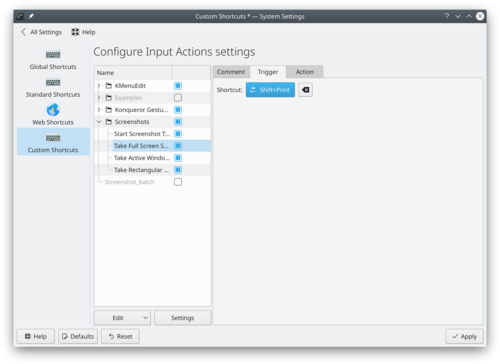Spectacle/Tutorials/Invoking Spectacle with custom shortcuts: Difference between revisions
No edit summary |
(formatting tweaks) |
||
| (8 intermediate revisions by 3 users not shown) | |||
| Line 1: | Line 1: | ||
The default way to capture your screen to a file is to press the PrintScreen key. The program | <languages /> | ||
<translate> | |||
<!--T:1--> | |||
The default way to capture your screen to a file is to press the <keycap>PrintScreen</keycap> key. The program [[Special:myLanguage/Spectacle|Spectacle]] will pop up. It allows you to capture | |||
<!--T:2--> | |||
* the complete screen | * the complete screen | ||
* single windows | * single windows | ||
* a rectangular region on the screen | * a rectangular region on the screen | ||
However | <!--T:3--> | ||
However, some people want their screenshots to be stored without any further interaction. This can be useful during documentation work when you want to do a lot of screenshots without interrupting work. One solution is to set up <keycap>Shift + PrintScreen</keycap> to trigger a screenshot. To do this | |||
* start | <!--T:4--> | ||
* start System Settings, navigate to <menuchoice>Shortcuts</menuchoice> -> <menuchoice>Custom Shortcuts</menuchoice> -> <menuchoice>Take Full Screen Screenshot</menuchoice> | |||
* click on Trigger -> Shortcut and press | |||
<!--T:5--> | |||
* click on <menuchoice>Trigger</menuchoice> -> <menuchoice>Shortcut</menuchoice> and press <keycap>Shift + PrintScreen</keycap>. Shift+Print should then appears in the button: | |||
<!--T:6--> | |||
[[Image:Spectacle-systemsettings-printscreen.png|center|500px| | |||
Setting up Shift + PrintScreen as global shortcut]] | |||
<!--T:7--> | |||
* click on <menuchoice>Apply</menuchoice> | |||
<!--T:8--> | |||
Now whenever you press <keycap>Shift + PrintScreen</keycap> your screen will be saved to your Pictures folder with a timestamp in its name, e.g. | |||
{{Path|Screenshot_20190107_224731.png}}. | |||
== More Information == <!--T:9--> | |||
<!--T:10--> | |||
* [[Special:myLanguage/System_Settings/Custom_Shortcuts|System Settings/Custom Shortcuts]] | |||
* | * [[Special:myLanguage/Spectacle|Spectacle]] | ||
<!--T:11--> | |||
[[Category:Graphics]] [[Category:Tutorials]] | |||
</translate> | |||
Latest revision as of 09:46, 12 July 2019
The default way to capture your screen to a file is to press the PrintScreen key. The program Spectacle will pop up. It allows you to capture
- the complete screen
- single windows
- a rectangular region on the screen
However, some people want their screenshots to be stored without any further interaction. This can be useful during documentation work when you want to do a lot of screenshots without interrupting work. One solution is to set up Shift + PrintScreen to trigger a screenshot. To do this
- start System Settings, navigate to -> ->
- click on -> and press Shift + PrintScreen. Shift+Print should then appears in the button:

- click on
Now whenever you press Shift + PrintScreen your screen will be saved to your Pictures folder with a timestamp in its name, e.g. Screenshot_20190107_224731.png.
